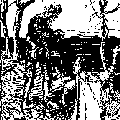42. Discovery of the Pacific
"This day is full of glorious victory, Echoes of conquest whisper from afar In every wave of the remembering sea. " —H. BEGBIE.
Among all the wonderful stories in the discovery of America there is none more thrilling than that of the Spaniard Balboa, the stowaway, who found the great Pacific Ocean lying beyond the newly discovered country.
All eyes were now turned towards America. Ship after ship still sailed westward. Still no one had as yet crossed the mainland, no one knew for certain that a great sea washed the farther coast of the new world which lay between Europe and Asia, Spain and China.
Among others who left Spain to settle in the new colony of Hayti, founded by Columbus, was Vasco Nuñez de Balboa. He had not been a successful tiller of the soil, and before long he found himself in debt. By law no debtor was allowed to leave the country, so Balboa had been forced to see expedition after expedition depart from Hayti for adventure and conquest, leaving him always behind.
One day a ship sailed away from the new colony. On board were soldiers, sailors, arms, and food. In the midst of the cargo stood a barrel, supposed to contain food. But it contained a live man instead. The ship was well out to sea, when the stowaway crawled out of his barrel and appeared on deck. It was Balboa, the Spanish knight. The captain was very angry, and threatened to land him on a desert island. But Balboa's entreaties touched him, and he was allowed to sail on with the rest of them. They were close to land when the ship ran upon a rock, and was very soon dashed to pieces.
Balboa—a "man who was never deterred"—now rose to the occasion. He led the shipwrecked party to a friendly Indian village near Darien. The Spaniards were on the narrow neck of land now known as the isthmus of Panama, which joins North and South America, though they knew it not. Arrived here, Balboa deposed the captain, sent him back to Hayti, and made himself governor of the little colony. He explored the neighbourhood, finding Indian villages rich in gold and the chiefs ready to give information about the new country.
One day some gold was being weighed out to the Spaniards, who were quarrelling over the quantity, when the prince, who was disgusted with their behaviour, dashed the gold from the scales, crying, "What is this, Christians? is it for such a little thing that you quarrel? If you have such a love of gold that to obtain it you harass the peaceful nations of these lands, I will show you a country where you may fulfill your desires. You will have to fight your way with great kings, among them one whose country is distant from our country six suns. " The prince pointed away to the south, where, he said, lay a great sea. There were sails and oars on the sea, and if they crossed it they would find a land of great riches, where people drank out of golden cups.
A feverish longing to find this great sea seized Balboa, but he could not reach it with so few men. So he sent a messenger back to the King of Spain to beg for help. Storms raged in the Atlantic Ocean, and it was eight months before the messenger reached Spain. Then he found that the captain deposed by Balboa had been before him and poisoned the king's mind against his subject. Something of this reached the ears of Balboa in distant Darien. He felt his dismissal would come, and he must find the great new sea first.
So he collected about two hundred men and started on his perilous expedition. Making friends of the Indians he met, Balboa reached at last the high range of mountains which divided him from the other coast. Led by native guides the Spaniards struggled up the steep sides, up and ever upwards. At last the guides signed to Balboa that he was near the top. He bade his men sit down. He must be alone to see that great sight for which his soul had yearned. It was all true. As he reached the summit of the peak he looked down over the vast Pacific Ocean, bathed in the brilliant light of a tropical sun. He was the first man from the old world who had seen it. Falling on his knees, he thanked God, for that he had discovered the Sea of the South.
Then he beckoned up his men.
"You see here, gentlemen and children mine," he said, when they had gathered at the top and were feasting their eyes on the view before them, "the end of our labours. " It was not unlike the moment when Hannibal stood on the top of the snowy Alps and pointed to his men the land of Italy lying below in the sunshine.
Then, having sung the "Te Deum," they made a cross, heaped up stones, and took formal possession of the sea and all that was in it in the name of the King of Spain. After this they made their way down the farther side of the mountain to the beach. Finding two native canoes on the shore, two men sprang in and pushed off, crying aloud that they were the first Europeans to sail on the new sea, while Balboa waded in up to his hips, sword in hand, to take possession of the sea for Spain.
Thus on September 29, 1513, was completed the first discovery of the Pacific Ocean. The discoverer, Balboa, was made governor of the new sea, but five years later he was beheaded by one who was jealous of his powers.

